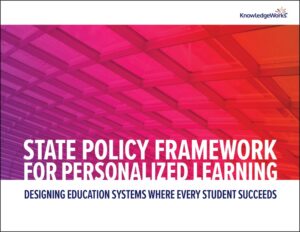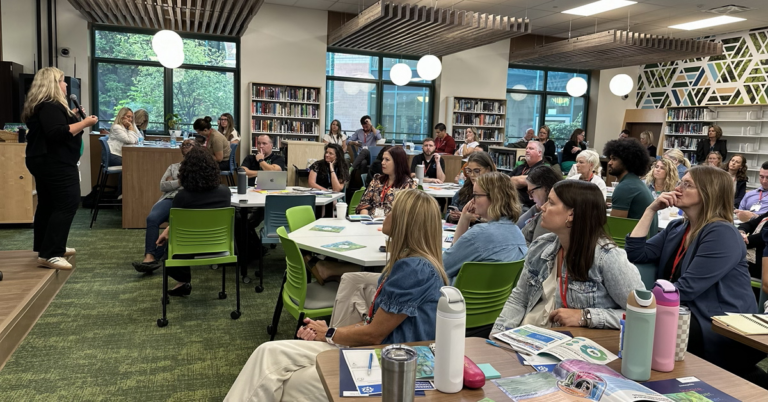College and career pathways can and should be viewed as integral components of ensuring that all learners have access to personalized educational experience.
These pathway opportunities often include dual and concurrent enrollment as well as early college high schools, each of which give students an opportunity to earn college credit while still enrolled in the K-12 system.
The College in High School Alliance (CHSA), of which KnowledgeWorks is a founding partner, recently published a series of state policy recommendations looking at how state policies could best increase access to these opportunities for an often overlooked population, students with disabilities. As a next step, KnowledgeWorks and CHSA partnered with Think Inclusion to analyze Colorado’s framework in the context of these recommendations.
“This work with Think Inclusion represents an important step towards our goal of strengthening the connection between college in high school policies and personalized, competency-based learning,” said Jon Alfuth, KnowledgeWorks senior director of state policy. “All students deserve to have access to pathways like these, no exceptions.”

There are 12 policy conditions states need to tackle as they refine and transform their policy system to one that ensures all students in the state benefit from high-quality personalized learning experiences. Learn more in our State Policy Framework for Personalized Learning.
Since legislation passed in 2009, the number of Colorado high school students enrolled in college courses has increased dramatically. 97% of Colorado school districts now offer concurrent enrollment and have experienced an 11% growth in student participation.
During the past few years, Colorado has made a concerted effort to improve equity in all college in high school programs. And their efforts have paid off, with participation rates for all race/ethnicity categories are increasing. In fact, the demographics of concurrent enrollment participation now closely resemble the composition of Colorado public high schools for almost all groups, with one exception — students with disabilities.
Through the joint efforts of the Colorado Department of Higher Education, Department of Education, the Colorado Community College System and with support from the Governor’s Office, Colorado was chosen to receive technical assistance from CHSA.

Colorado is ahead of the pack in terms of policy but still has room to grow. I believe this analysis will help push the state to become a model for how the rest of the country can ensure that students with disabilities have equitable access to these programs.
Using the recently released framework, Unlocking the Potential of College in High School Programs for Students with Disabilities, we have created a unique landscape analysis for Colorado that both identifies barriers faced by students with disabilities in accessing these opportunities as well as potential action steps to address these obstacles.
“Colorado is ahead of the pack in terms of policy but still has room to grow,” said Karla Philips-Krivickas of Think Inclusion. “I believe this analysis will help push the state to become a model for how the rest of the country can ensure that students with disabilities have equitable access to these programs.”
Policy recommendations to increase access to concurrent enrollment in Colorado
This report considers three pressing issues Colorado must address to improve concurrent enrollment access and success for students with disabilities. Each issue is followed by a series of strategies to help the state define the participation gap in concurrent enrollment for students with disabilities and clearly articulate the pathway to improve access and success for students with disabilities.
- Strengthen data collection for students with disabilities regarding their participation in concurrent enrollment opportunities.
- Increase access to concurrent enrollment for students with disabilities.
- Provide students with disabilities the services and supports necessary to succeed in concurrent enrollment.
Read more state policy recommendations from CHSA:
- Illinois Dual Credit Report: Current Policy Landscape and Policy Recommendations
- Within Reach: A Policy Roadmap for Dual Credit in Indiana
- Unlocking Potential’s in College in High School: Policy Landscape and Recommendations – Ohio
- Expanding New York’s College in High School Programs
- Maine Early College Report
- Unlocking Potential: A State Policy Roadmap for Equity and Quality in College in High School Programs
Read the full report on Colorado.







